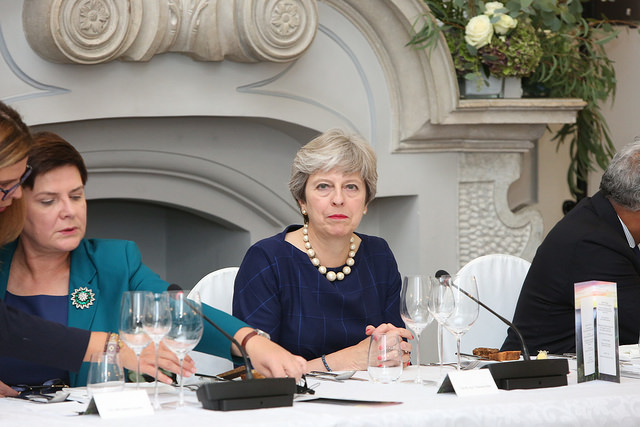The Conservative Party Conference was a joke with a flat punchline. The Chancellor tried to cover up his government’s weaknesses by hurling mud at Jeremy Corbyn, while Boris Johnson and Jacob Rees-Mogg stole the spotlight. But it all came to a head with Theresa May’s speech. It is clear this state of affairs can’t go on forever, but when the end comes the Tories will still have to find a way to turn around their party.
The right is on the defensive for the first time in decades, and the left has the upper-hand. It’s a beautiful sight to behold. Bob Halfon and others have been floating ideas for fending off the Labour left. This is why the Tories have made several bizarre moves this summer, such as the foundation of Activate and the attempt to set up a right-wing version of Glastonbury. If only politics were so simple.
Even without May, the Conservative government will have to find a way to reinvigorate its domestic agenda in light of Brexit. The major problem comes down to the fact that the UK economy lacks the sizeable industrial base it needs for an export-led growth strategy. Without this base, the UK cannot just leave the EU and maintain existing trade relations. But the Tories have spent decades carving up the industrial base and throwing the chunks to the wolves.
As if this weren’t bad enough, the Tory Party has to reassure its social base – particularly, the middle classes – that the policies are actually worthwhile. The prospect of declining living standards is not an easy sell at the best of times. This is even harder when you no longer have a cohesive political agenda. Brexit is what stands in the way of such an agenda being forged.
However, Brexit is just the factor that has reopened an old vacuum in the Tory machine. The party has suffered from a lack of strong leaders and ideological coherence since Thatcher was ousted in 1990. David Cameron was the exception, but every other Tory leader has been a dismal failure. As Michael Portillo observed just after the Conservative victory in 2015, the party had no reason to exist other than to preserve and defend the Cameron legacy.
That worked out well, didn’t it? Almost 18 months on and the Conservative Party is facing defeat at the hands of the most radical Labour leader in history. The situation is so dire that the party fears it has to support Theresa May rather than face another election further down the line. This is why Grant Shapps (a.k.a. ‘Michael Green’) could not muster the solidarity of 48 MPs to initiate a no-confidence vote.
If it were not for the threat of Corbynism, the Tories would have already ousted May and replaced her with some new mediocrity. These people are not sentimental nor are they prone to mercy. The reason the Shapps plot did not amount to a putsch was that there is no clear candidate to replace May and save the day. It’s not like the job is particularly appealing right now.
Not that this kills off all ambitions to become PM. The most well known politician in the cabinet is Boris Johnson, who has been positioning himself to take the reigns for years. But Boris just wants to be PM for the sake of being PM. He has no political agenda, no convictions or any serious principles, except for his own self-advancement. This may be why Johnson has been acting out lately.
The problem for Boris is that he is more popular among members than the parliamentary party. It is likely the Johnson campaign would be knocked out by the first or second round, before the members even got to play a role in the contest. This makes it very difficult for him to become Tory leader. And there are fairly high barriers against other possible contenders.
Although Amber Rudd took May’s place in the debates, it is unlikely she could take her place in 10 Downing Street because she could easily lose her seat at the next election. Likewise, the Scottish Tory leader Ruth Davidson could be the best woman for the job, but she cannot run because she is a member of the Scottish Parliament. This leaves the field pretty thin.
Ordinarily, David Davis would be a major candidate for PM. He has the experience, the credentials, even a few good principles and he looks like a leader in waiting. The problem is Davis has not had time to wash the muck of EU talks off of his hands yet. Whatever credibility he had as an opposition politician has been eroded by the Brexit negotiations. Davis could still be the next leader, but it would probably not change the party’s standing in the public mind.
The lack of talent has been one reason for strange developments like Activate, the attempt to build a Momentum-like campaign around the Conservative leadership. But it soon became apparent that the astroturfed campaign needed a hero. Certainly Theresa May isn’t an inspiration, so the young fogeys shifted in favour of the MP for North East Somerset: Jacob Rees-Mogg.
This tells you more about meme culture than the future of the Conservative leadership, which will be decided by Tory MPS – not party members, WhatsApp groups or online forums. Mogg taking over the government would be a disaster for the ruling party. There is very little appetite among the public for a posh eccentric leader with terrifying views. Still, it is an amusing possibility.
Despite his past as a hedge fund manager, Jacob Rees-Mogg has styled himself Catholic High Tory traditionalist and takes contrarian positions on the EU, immigration, gay marriage and abortion. Yet the rest of Mogg’s political opinions are no different to those held by David Cameron and George Osborne. He supports free trade, deregulation, privatisation and austerity. In other words Mogg is just a small government liberal, except when it comes to foreigners, queers and foetuses.
Though the fact that the party activists are considering Mogg does represent something real. There is hunger from the Conservative grassroots for a hard-right government. May tried to tap into this and reinvent the centre ground along such lines. It proved to be an electoral failure. And it will likely prove to be a failure again.
Photograph courtesy of EU2017EE Estonian President. Published under a Creative Commons license.





